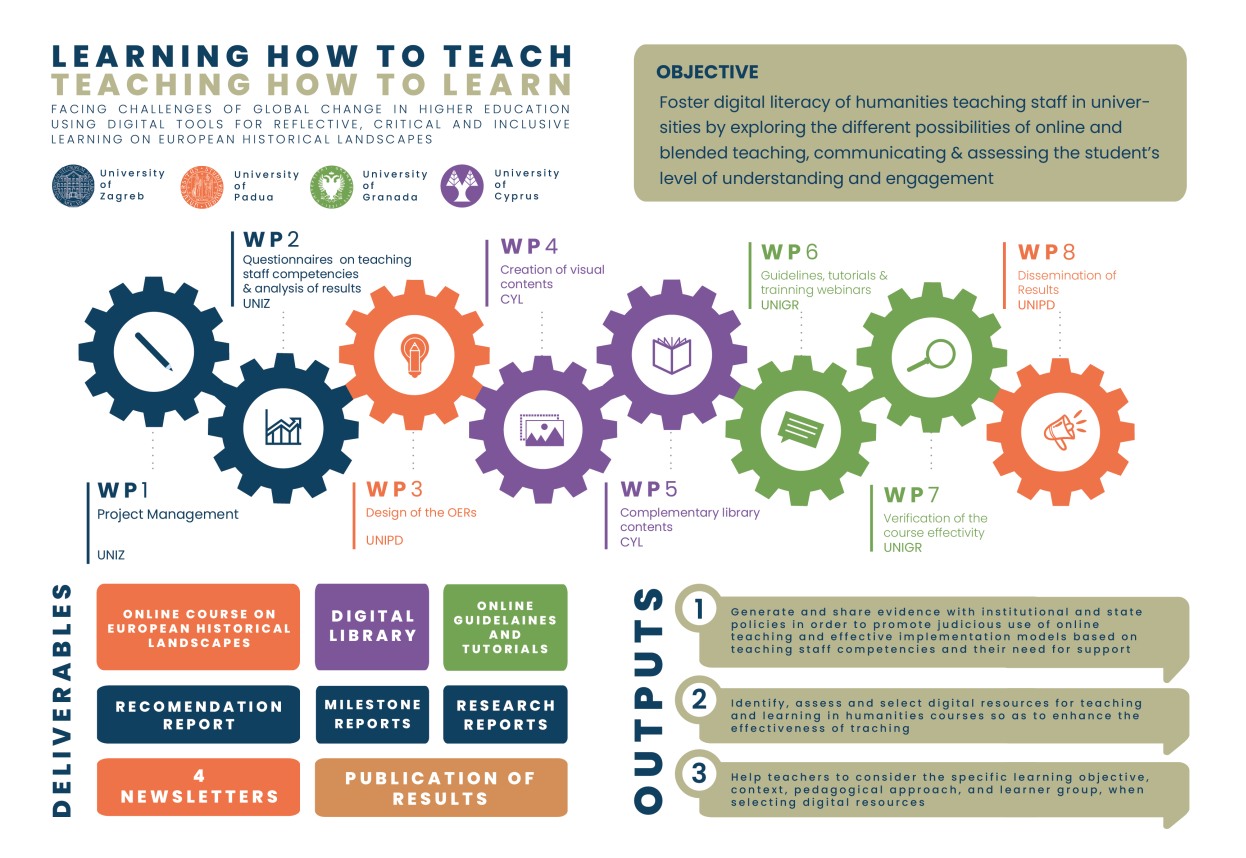
ABOUT PROJECT
As a consequence of the COVID-19 pandemic lockdown, most universities were closed in March 2020. Although many began partially re-opening from September, far-reaching restrictions, and any prediction as to when the situation will end seems to be hardly possible at the moment. The situation now (October 2020) seems to be worsening and in some areas teaching is slowly returning to be online. Teaching staff face significant challenges in adapting to new ways of teaching, maintaining adequate communication with students, supporting students’ learning and development, and assessing their progress.
Research conducted by UniPD during the lockdown (April 2020), using online questionnaires among university teaching staff, has shown a worrying gap between students’ adaptability to the online situation and that of teaching professionals. Most university students are digital natives, born and raised in a digital environment and therefore ready to shift and adapt to the digital context. On the other hand, the great majority of university teaching staff continued teaching as if they were in a classroom, through video and audio conferencing platforms and uploading traditional PDFs of texts and PowerPoints. Very few university professors tried to exploit the pedagogic benefits of online teaching and most complained about the lack of interaction with students, showing little knowledge of the wide number of interactive possibilities of online learning and assessment applications. Although many universities have well-established eLearning support services, most teachers admitted that they never undertook any kind of eLearning course and themselves acknowledged their lack of digital competencies. In addition, most saw the need for digital competence as limited to this specific current situation, rather than a long-term requirement.
Objectives of this project are:
1. to foster digital literacy and tackle disinformation among humanities teaching staff in universities in Mediterranean countries, researching how (or if) they are adapting their teaching to the new online context and
2. to engage teaching staff in exploring the different possibilities of blended teaching, communicating and assessing the student’s level of understanding and degree of engagement with the learning system through specific open educational resources with contents linked to the Humanities area. In particular, a “ready to use” online interactive course will be developed using different formats of teaching material (videos, live, readings) and a range of assessment activities created also for the inclusion of disabled students.
To fulfil these objectives four participating organisations have gathered sharing their complementary expertise: Padua (5 persons), in the subject chosen for the main objective, the interactive course on European historical landscapes; the IT skills and expertise of Cyprus will be the base of digital content creation and supplementary content library (4 persons); the expertise of Granada (4 persons) in online teaching will be used to create guidelines, tutorials and training webinars; Zagreb (7 persons) will deal with the initial questionnaires and their ponderation (statistical weight) and of the course because of multidisciplinary competence of its team (psychology, pedagogy, sociology). The targeted group are higher education level teachers.
The final result, complemented by a supplementary content library, and a complete training plan with online guidelines and tutorials and webinars, is a course in European Historical Landscapes, a multidisciplinary topic involving a wide range of teaching professionals, including different thematic units:
1. Meaning and values of historical-cultural traditional European landscapes.
2. Methods for cataloguing and analysing historic landscapes in their complexity and diachrony, including remote sensing sources, artificial intelligence methods, GIS analysis, geomorphological information but also traditional sources such as cartography, archive documents and archaeological survey. The unit will also develop how to implement this kind of studies through participatory research with local communities.
3. Historical relationship between humans and nature in terms of production, ecosystem services, sustainability and resilience capacity in the framework of Global Change.
4. Social relationships derived from socio-ecosystem construction, including not only economic relationships but also gender, community building capacity, governance structures, traditional ecological knowledge creation and dissemination, symbolic cultural elements linked to landscape.
5. Impact and perspectives on social, economic (including tourism), cultural sustainable development.
The final impact is foreseen in the benefits of the involved teachers in the Humanities area. Long term benefit lies in the use of the methodology, guidelines and tutorials for a wide range of other courses, because it will remain in open access
